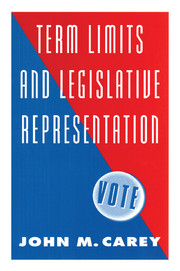2 - Institutions and electoral reform: Comparing the cases
Published online by Cambridge University Press: 06 July 2010
Summary
Before evaluating the impact of term limits on congressional behavior and organization, it is necessary to provide some background to the cases that will be considered in this study. Within that agenda, this chapter has four goals: (1) to provide general overviews of the national political institutions of Costa Rica and Venezuela, focusing especially on the national assemblies and party systems of each country; (2) to illustrate the institutional similarities between the two systems, and in doing so, underscore their appropriateness for comparison; (3) to highlight differences in the agenda for electoral reform in the two countries, with the focus, of course, on the question of reelection for legislators; and (4) to contrast the central issues of legislative organization and electoral reform in the Latin American cases with the United States, examining how term limits might account for differences and patterns of change across the cases.
More specifically, the chapter proceeds as follows. First, I provide a brief description of Costa Rica's Legislative Assembly, its relationship with the executive, and its internal organization. Then I review the political events leading up to the Civil War of 1948 and Constituent Assembly of 1949 that imposed term limits. I then examine the Constituent Assembly itself and the attention given to electoral reform by those who observed it and wrote about it. In the next section, I examine the arguments surrounding a number of subsequent constitutional reform proposals seeking to abolish or modify term limits.
- Type
- Chapter
- Information
- Term Limits and Legislative Representation , pp. 26 - 68Publisher: Cambridge University PressPrint publication year: 1996



